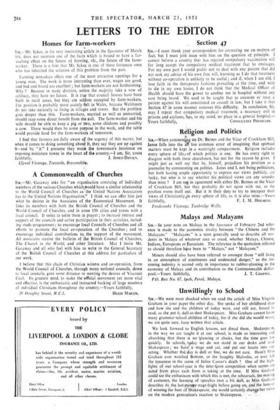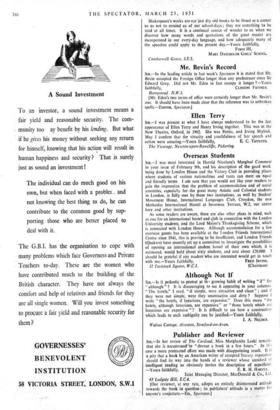Unwillingly to School
SIR.—WC were most shocked when we read the article of Miss Virginia Graham in your paper the other day. She spoke of her childhood days and how she and the children of today were, and still are, forced to read, as she put it, dull-as-dust Shakespeare. Miss Graham cannot know many grammar-school children of today, for if she did she would never, we are quite sure, have written that article.
We look forward to English lessons, not dread them. Shakespeare, in the way we are taught it at our school, is made so interesting and absorbing that there is no 'glancing at clocks, but the time goes too quickly. In schools. today we do not stand in our desks and read Shakespeare ; we have a stage and act, and put our hearts into our acting. Whether the: day is dull or fine, we do not care. Hasn't Ttliss Graham ever watched Bottom, or the haughty Malvolio, or ever felt the tenseness in the scene of Julius Caesar's death ? One of the high- lights of our school-year is the inter-fprm competition when scenes are acted from plays each . form is taking at the time. If Miss Graham could see the enthusiasm with which this is met, the rehearsals, the making of costumes, the learning of speeches (not a hit dull, as Miss Grah3,n describes it), the last-mingle stage-fright.before going on, and the honour of winning the bust of Shakespeare. she would Certainly.chanoiher views
on the modern generation's reaction to Shakespeare. -
Shakespeare's works are not just dry old books to be thrust in a corner so as not to remind us of our school-days ; they are something to be read at all times. It is a continual source of wonder to us when we discover how many words and quotations of the great master are incorporated in our every-day language, and how adequately many of the speeches could apply to the present day.—Yours faithfully,
Camberwell Grove, S.E.S. FORM III,
MARY DATCHELOR GIRLS SCHOOL-



































 Previous page
Previous page